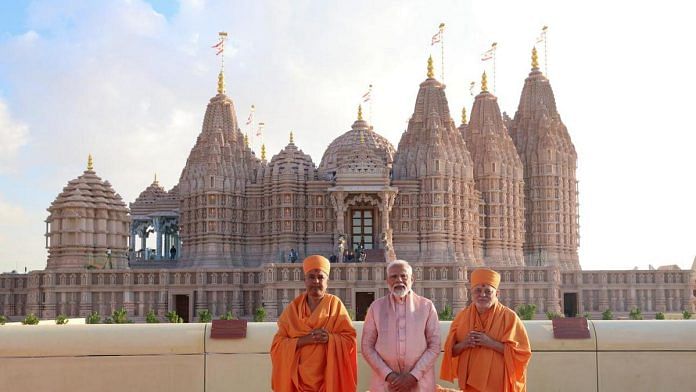India and the UAE have cultivated a deep connection, ranging from official diplomatic engagements to vibrant cultural exchanges at the grassroots level. As both nations navigate the complexities of modern diplomacy, their historical ties serve as a sturdy foundation upon which to build a future of prosperity and friendship. Prime Minister Narendra Modi’s inauguration of the first Hindu temple in Abu Dhabi on Wednesday marks yet another milestone in this journey.
During my childhood in Abu Dhabi with my parents, we, as Muslims, did not feel any lack of religious fulfilment. However, despite the city’s cosmopolitan atmosphere, there were moments when the spiritual needs of non-Muslims seemed overlooked. My mother often recounted tales of our Hindu friends yearning to visit temples, especially during festivals and special occasions—a sentiment I found deeply saddening.
Coming from India, where minorities are afforded dignity and their rights, including religious freedom, are respected, it was disheartening to witness this disparity. India boasts lakhs of mosques despite the minority status of Muslims, so it felt strange and sorrowful to see that the UAE lacked similar provisions for people of other faiths, even if they were expatriates rather than citizens. The contrast left one questioning the UAE’s stance toward religious tolerance and diversity. However, the scenario has been improving slowly.
Also Read: Indian Muslim women need UCC. It challenges power of self-appointed judicial bodies
Positive shifts toward diversity in the UAE
In contrast to other regions in the UAE, Dubai’s Sheikh Rashid bin Saeed al Maktoum took a significant step in 1958 by allowing a place of prayer for Hindus to be built. This temple was established on the first floor above a maze of traditional shops in Bur Dubai. Unfortunately, this historic temple closed its doors last month, and relocated, along with the gurudwara at the Bur Dubai complex, to another site in Jebel Ali. For decades, this temple stood as the solitary sanctuary for Hindus, who constitute roughly 6.6 per cent of the UAE’s population.
Therefore, witnessing the inauguration of the Bochasanwasi Akshar Purushottam Swaminarayan Sanstha (BAPS) temple in Abu Dhabi this week filled me with joy as an Indian Pasmanda Muslim.
This event not only marks a significant moment for the Hindu community in the UAE but also reflects a shifting attitude towards other religions and their followers in the region. In 2016, the UAE established the Ministry of Tolerance and Coexistence, marking a significant step towards fostering harmony and inclusivity within its diverse society. Other than the BAPS temple, the UAE government’s evolving stance on religious diversity is also exemplified in its decision to construct the Abrahamic Family House, unveiled in February 2023. This innovative space, which includes a church, mosque, and synagogue, is dedicated to fostering mutual understanding among people of multiple faiths and belief systems. Before this, in 2019, 17 Christian churches in the city were also granted official recognition. Today, the UAE is home to approximately 40 churches and 700 ministries, reflecting its commitment to embracing and respecting the religious diversity of its populace.
Also Read: Indian Muslims need real leaders, not divisive ones. Pasmandas offer future-positive vision
India should take a cue from UAE temple
The construction of the BAPS temple is not only a positive step towards inclusion by the UAE, but also holds significant implications for bilateral ties. Further, it also offers a lesson for India and Indian Muslims. The UAE’s embrace of diverse religions underscores a fundamental truth: respect for other faiths does not equate to blasphemy or a compromise of one’s own religious identity.
This realisation is particularly pertinent amidst the rise of takfirism—the practice of labelling others as apostates—among Indian Muslims over the past three decades. This trend indicates a mindset that’s incongruent with the historically pluralistic ethos of Indian society. The visionary leadership of UAE President Sheikh Mohamed bin Zayed shows that secularism is not a one-sided concept but a reciprocal commitment to mutual respect and coexistence.
India’s vast number of mosques, despite being a predominantly polytheistic civilisation, exemplifies a gold standard of secularism upheld by our Hindu brethren. Consequently, there arises a need for flexibility regarding contentious issues such as Kashi and Mathura, and to draw inspiration from historical figures like Akbar, who championed inclusivity by translating the Ramayana into Persian. Moreover, the ‘Wall of Harmony’, gifted by the Bohra community for the BAPS temple in the UAE, symbolises the diverse contributions to fostering unity.
However, entrenched attitudes of religious supremacy risk perpetuating a cycle of discord and division. Refusing to acknowledge the realities surrounding Ayodhya, Kashi, and Mathura mirrors the extremist sentiments advocating for the construction of 40,000 temples to replace Muslim places of worship—an approach that even RSS chief Mohan Bhagwat has cautioned against. Such obstinacy, from both Muslims and Hindus, will only cause mayhem and conflict. In this, Bharat Mata will be the loser and the only winners will be all the internal and external enemies of Bharat.
Amana Begam Ansari is a columnist and TV news panelist. She runs a weekly YouTube show called ‘India This Week by Amana and Khalid’. She tweets @Amana_Ansari. Views are personal.
(Edited by Asavari Singh)




Hindu is the only tolerant religion on the planet…that is the reason why people from all the religion are staying Imdia and Growing….where ever muslim are more than 20% in population all other religions are facing problems with them…whether is it America or Africa or europe or Australia